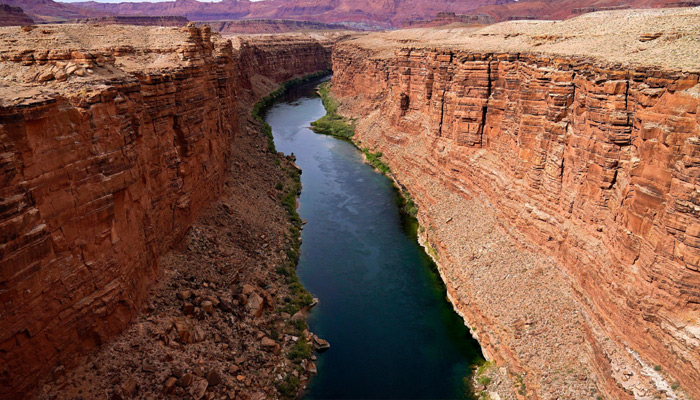The harmful effects of global warming are being felt very starkly across the United States.
With extreme temperatures and heatwave sweeping the southern part, Americans have experienced climate change like never before. According to a report published by CNN, the Colorado River Basin has lost more than 10 trillion gallons of water between 2000 and 2021 due to rising temperatures. In terms of volume, the lost water could have filled Lake Mead.
Notably, the Colorado River runs through seven Western states and provides water for drinking, irrigation etc. to around 40 million people in the United States. Researchers at UCLA have found that climate change caused by humans has contributed to significant decline of the river which is a lifeline to millions of Americans. According to the study published in the American Geophysical Union’s Water Resources Research, extreme temperatures in the West have caused about a 10% decrease in the river’s flow in the last two decades.
Researches say that the river’s first-ever water shortage was declared as an impact of the climate crisis on the basin. Notably, Tier 1 shortage was declared in January 2022. A Tier 2 shortage was implemented in January 2023 due to even lower water levels in Lake Mead, USA’s largest reservoir.
“When we set out on this study we were aware of the mega-drought and the impacts it was having on Lake Mead’s water levels,” Benjamin Bass, a water resources engineer and the study’s lead author, told CNN.
“We really wanted to provide a study that was able to look at that long-term drought event and the impacts of anthropogenic climate change,” added Benjamin.
Last summer, the water level in Lake Mead had dropped to an alarming 20 feet over the course of four months. Mead which is fed by the Colorado River, fell to its lowest level to-date in July 2022, with lake elevation of 1040 feet. Had it fallen an additional 145 feet, the reservoir would have hit “dead pool”, the point at which it would be not be able to provide water or hydroelectric power to millions of Americans.
Rising temperature is causing increased evaporation in snowier states like Colorado, where the river’s headwaters begin.
“It’s increasing more across the snow-packed region as compared to regions without snowpack,” said Benjamin, highlighting that reduction of water is happening “twice as fast” in snowier regions. Positive albedo effect is to be blamed as the cause because when more snow melts with higher temperatures, it exposes darker ground which absorbs still more heat.

